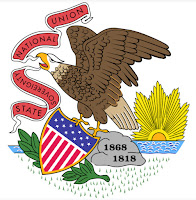The State of the State

by Mary Ellen Daneels, Civics Instructional Specialist This week, the Illinois Civics Hub turned its attention to Illinois state politics by hosting the WBEZ Government and Politics team for an hour webinar on “the state of the state.” WBEZ Political Editor Alex Keefe was joined by state political reporters Dave McKinney and Tony Arnold to provide an overview of, “key issues in Springfield, the latest politics – and how to keep up.” Topics included redistricting, the Commonwealth Edison scandal, calls for ethics reform, new leadership in the General Assembly, rumblings about who is running in 2022, and the financial challenges facing the Land of Lincoln. If you missed the webinar, you can access a recording to watch at your convenience. Illinois School Code requires students to receive instruction on the state constitution in both middle and high school. This webinar provided context for #CivicsInTheMiddle classrooms to make direct instruction on the government institutions in t...





